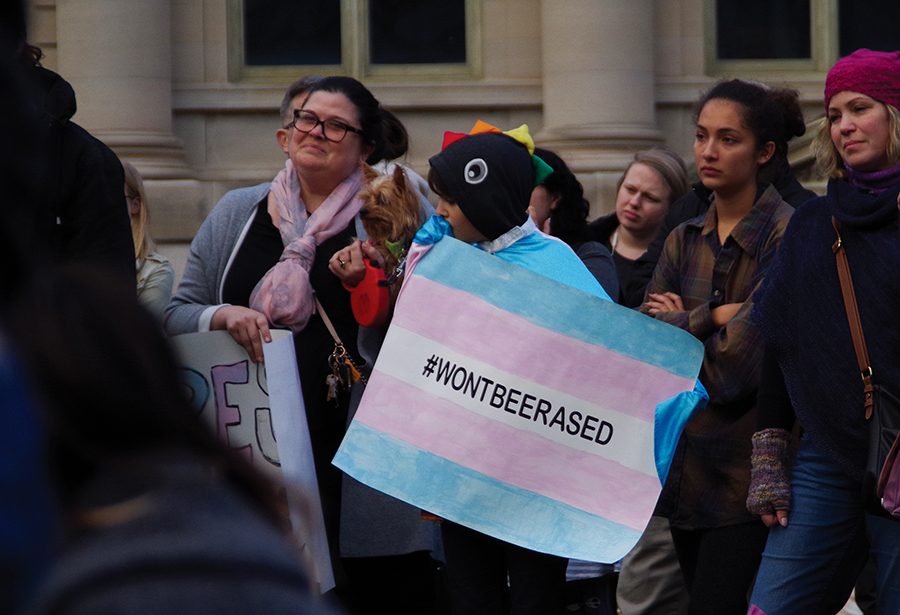Iowans weigh in on bill limiting gender identity in curriculum
If passed, elementary students would have to opt-in to learn about gender identity.
Community members hold signs in support of transgender rights at a “Support Trans Lives” rally at the Pentacrest Oct. 25, 2018.
February 18, 2021
A bill outlining how gender identity is covered in elementary schools was introduced in the Iowa Legislature Jan. 26. Titled Senate File 167, the bill would ban elementary students statewide from learning about gender identity unless they receive written permission from a parent or guardian to opt in.
In a virtual meeting open to the public, community members and lobbyists alike provided input on SF 167 Feb. 16. Education subcommittee members Sen. Jim Carlin (R) and Sen. Ken Rozenboom (R) facilitated the discussion from Senate chambers in Des Moines. About 60 community members attended, and 16 individuals voiced their position on the proposed legislature.
Two West High students voiced their opposition to the bill at the meeting. Paras Bassuk ’21 spoke of the benefits of teaching about gender identity and emphasized how, despite the bill affecting students, the nature of the meeting time limit hindered student input.
“Instruction of gender identity to all Iowa’s students is vital to the well-being of our state,” Bassuk said. “Gender inclusive curriculum in K-12 schools establishes a culture of acceptance that is sorely needed. We must ensure that our students understand the principles of diversity, equity and inclusion in schools, and the censorship of inclusive curriculum would do the opposite.”
Bassuk also highlighted the recent increase in anti-transgender bills being introduced to the Iowa Legislature.
“The wave of discriminatory anti-trans legislation in Iowa is not tolerated by our country at large. Iowa still relies on interstate relationships and these discriminatory laws will further alienate Iowa from our neighbors,” Bassuk said.
In addition to SF 167, recently introduced bills SF 80, SF 224, HF 184, and HF 334 also target transgender individuals in schools.
Colors Club President Ella Rosenthal ’21 was also present at the meeting and opposed the bill. She argued that all students should learn about gender identity to gain new perspectives and develop empathy.
“If you disagree with someone that doesn’t mean that you’re not required to learn about them. Simply because I or my parents don’t see a group of people or a topic as valid or aligning with my views, I still need to learn about them,” Rosenthal said.
Community members outside of West also voiced concerns about the bill. Liz Lundberg is an educator at the University of Iowa and is the mother of a 5-year-old transgender daughter. She worries failing to teach gender identity to transgender youth could have adverse effects on mental health.
“Transgender kids are subject to high levels of bullying, violence and exclusion. These experiences lead to poor academic outcomes and mental health issues, up to and including horrific rates of suicide,” Lundberg said. “Whether you believe those kids are who they say they are, or if you think they are confused, I know you don’t want them to suffer these outcomes when they see themselves reflected in their education and learn about gender identity in school settings, they see themselves affirmed, they see that they matter, they see that others care about them and that they belong.”
Community member Sarah Chang also expressed concerns about future impacts of the bill.
“If gender identity is not being unfairly singled out, where is the line drawn? [Do] students have to be opted in to learn about various cultural identities and religious identities? If so, then the whole social studies curriculum might as well become opt-in. If not, don’t single out topics for exclusion from mention in educational settings,” Chang said.
Another concern was the element of local control. Phil Jeneary with the Iowa Association of School Boards argued that the statewide bill would step on the element of local control, where many schools already have options for conversations and concerns of parents.
“This should really be a local decision. Most schools, if not all, already have a process for curriculum in this area that notifies the parents of when it’s going to be taught and if there are issues. Parents should be talking with the teachers, the administration on what can be done if they do have issues and I think most schools if not all, already have that avenue,” Jeneary said.
Although most speaking participants opposed the bill, Daniel Sunne was one of three attendees to express their support for it. He declared SF 167 as crucial in ensuring parents have control over their children’s learning.
“SF 167 offers elementary and middle school children some protection from the indoctrination by gender theory activists undermining parental teaching and ignoring biological reality,” Sunne said. “Parents are not informed that their children are being intentionally subjected to a curriculum designed to disrupt their idea of [gender].”
Chuck Hurley, Vice-President of The FAMiLY LEADER, echoed Sunne’s sentiments, adding that teaching students about gender identity could cause lifelong damage.
“[We need] to get some perspective from parents, like me, who do not appreciate having a curriculum that is, in my view, confused,” Hurley said. “This is not something that is minor; this can set a child on a trajectory for the rest of their life that, in many cases, is physically damaging through hormone treatments through surgeries and so on.”
Hurley’s concerns mirrored those of House Republicans. Recently introduced House File 327 would ban minors from gender-affirming care, which may include hormone treatment.
From here, SF 167 will go on to the Iowa House, where it will be discussed and voted upon before moving forward. The public can further voice their opinions regarding the passage of the bill by contacting their respective representatives.










